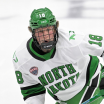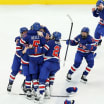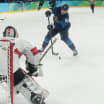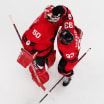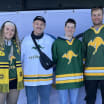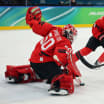LAS VEGAS --Bill Foley was having a burger at Shake Shack the other day in Summerlin, about 25 minutes west of the Las Vegas Strip, when a boy approached. The boy was maybe 11 or 12. At first, he stood and stared. Eventually, he shook Foley's hand.
"Mr. Foley," he said, "I just want you to know I'm really looking forward to you bringing hockey here."
Expansion-team owner thinks beyond Las Vegas Strip
Foley wants to build NHL franchise into international brand
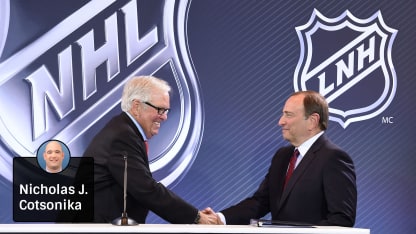
Foley has done it. He has landed an NHL expansion franchise that will play in a state-of-the-art, 17,500-seat arena on the Strip starting in 2017-18. He wants to build a winning team, a first-class organization and an international brand, selling jerseys and hats and T-shirts to the millions of people who visit each year from places as far away as China.
But "here" goes beyond the Strip, just as New York goes beyond Times Square, Chicago goes beyond Michigan Avenue and Toronto goes beyond Yonge Street. "Here" is Summerlin and Henderson and all the other parts of a metropolitan area that is home to more than 2 million people -- retirees, workers, parents, kids.
"Here" is what made Foley so confident that he and his group agreed to pay a $500 million expansion fee to own the team. "Here" is where Foley wants to make an impact.
Las Vegas isn't just an entertainment mecca anymore. It's a major-league sports town.
"Really the local residents aren't about the Strip," Foley said after the announcement Wednesday. "They're about going to good restaurants, and they're about going to local bars and having fun and having friends and playing golf and hiking in the red rocks. But the reality is, this gives Las Vegas an identity it's never had. It's going to be fun being a part of it."
Before the $500 million expansion fee, Foley and his group invested millions of dollars in consultants, market studies and advertising campaigns. Their research showed there were 130,000 potential ticket-buyers in the Las Vegas area: 75,000 avid hockey fans and 55,000 others interested in seeing a game.
When they did a season-ticket drive to gauge the viability of the market in 2015, they landed more than 14,000 season-ticket deposits and sold out their suites. People paid 10 percent of the ticket price, and some committed for as long as 10 years. The team has more than $7 million in ticket money in escrow.
That convinced Foley and his group, that convinced NHL Commissioner Gary Bettman and the NHL Board of Governors, and that will be the backbone of the franchise.
"I cannot overstate the importance that the season-ticket drive had," Bettman said. "The success that it had really got everybody's attention. … Demonstrating that there is a community here of people that are looking for the things that you find in other communities that aren't like Las Vegas or the Strip and everything else I think made an important impression."
The challenge now is to make the community proud, capture its imagination and grow the game. Foley and his group have only eight employees working in a 2,000-square-foot office. They plan to start hiring immediately and move into a bigger office in mid-August.
First, Foley wants to hire an assistant general manager who can start building a hockey operations department, and he wants put a ticketing system in place that will allow fans to choose their seats. Then Foley wants to settle on a nickname, the team colors and a logo. A West Point graduate, he prefers the Army nickname Black Knights with black, gold and gray, but we'll see.
"I'm going to be open-minded about the name and the team colors, but I am the majority owner," Foley said with a laugh.
Foley said he would submit a list of nicknames to the League and go through a selection process. He hopes to have an announcement in September or October and start generating revenue.
"Jerseys are 175 bucks each," Foley said. "If I can't sell a lot of jerseys in Las Vegas to 42 million people that come here, then I'm not a very successful salesman or businessman."
From there it's about building a team, a culture, a youth hockey program and the rest. He wants to make Las Vegas a place players want to live, play and win, where they are given everything they need to be comfortable with the expectation that they will perform, and he wants to make hockey a sport kids want to play. This is a fresh start from the allocation of salary-cap dollars to the building of a brand-new, two-sheet practice rink to be used by the team and the public.
"We haven't wasted our cap yet," Foley said. "We don't have a bunch of mistakes we've got to live through. So as long as we're careful, we should be able to field a very competitive team in Year 1, and we'll make the playoffs just as fast as we can. We're going to be dedicated. We're going to be focused. We're going to take no prisoners. And we expect to be successful early."
Foley is a successful businessman. That's why he has the money to do this. But that's not the only reason he's doing this. Some of us play fantasy hockey. Foley is taking a hockey fantasy and turning it into reality for himself, the city, the League and the game.
"This is really a personal deal that we've worked hard to accomplish," Foley said. "It's really a lot of fun, and it's going to be fun. The most fun is going to be the expansion draft and figuring out how we're going to put a really good team on the ice and our drafting and so on, and I'm going to be intimately involved in all that.
"So my other endeavors have been business-related and so on. Yeah, great. So you're successful. You do a deal that works out well.
"Now this is much different."
Better?
Foley smiled.
"Oh," he said, "much better."

